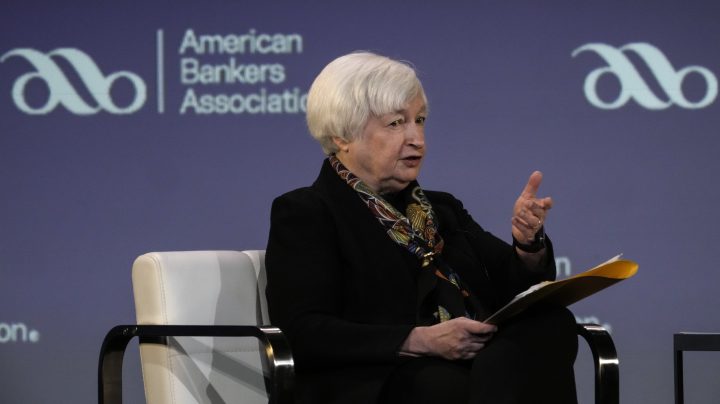
Bank failures have some small business owners re-thinking their own banking arrangements
Bank failures have some small business owners re-thinking their own banking arrangements

Earlier this week, Treasury Secretary Janet Yellen spoke at a banking conference about the government’s decision to protect both insured and uninsured depositors after Silicon Valley Bank and Signature Bank failed. Yellen went a step further to say that “similar actions could be warranted if smaller institutions suffer deposit runs that pose the risk of contagion.”
But even if that contagion hasn’t actually spread, the fear of contagion can be enough to cause people to pull their deposits.
One of the questions weighing on the minds of many small business owners is whether the government will step in and save their bank if the crisis gets worse.
“To be candid, our business has an account at a community bank, and we’re going to be opening another account at Chase, because it’s too big to fail,” said Nate Tobik, the founder of Complete Bank Data, a company that sells market data to banks.
Tobik said moving the money is a rational decision, since the Federal government saved the biggest banks after the 2008 financial crisis.
“If the government has said that we will never let J.P. Morgan fail, then it’s like, OK, I know if we have some operating money there, then that money is basically guaranteed by the government,” Tobik said.
Tobik said he’s concerned that smaller banks’ profits will erode if they have to raise the interest rates they pay to retain customers. But that’s not much of a problem for bigger banks.
“They have such a diversified business business line, they’re not reliant on those deposits, and the longer-term fixed loans, that a community bank is,” Tobik said.
But the big issue at play for most small businesses is the Federal Deposit Insurance Corporation, and the $250,000 per depositor limit on its coverage.
“[That’s] a decent amount of money, but businesses could have a $100,000-a-week payroll,” said Spiro Pappadopoulos, CEO of Schlow Restaurant Group, which operates seven businesses in several states.
In the past week, Pappadopoulos opened about a dozen new accounts at different banks to spread out his money and increase his FDIC insurance coverage. He’s also opening those accounts at bigger banks.
“We’re not leaving the smaller banks, but we’re not leaving excess of $250,000 at smaller banks,” he said.
Pappadopoulos said he wants to maintain his relationships with smaller banks, but he said it’s more convenient to open new accounts for his businesses at banks that serve all of the markets he operates in. It also helps that bigger banks tend to have more sophisticated technology.
“Opening accounts, getting security verifications done, apps on your phone,” Pappadopoulos said. “All that stuff is much better with the bigger banks, for the most part.”
Some businesses aren’t making any changes to their banking relationships.
Tiffany Turner, CEO of Adrift Hospitality, which operates hotels and restaurants on the Oregon and Washington coasts, said there’s a benefit to keeping her money at her community bank.
“It’s keeping your dollars local, where they’re going to continue to work for you, rather than shipping them off somewhere else,” Turner said. “Many, many mom-and-pops, and how we got started, was banking with our local community-based bank.”
Turner said keeping her money at the bank can help ensure that it keeps lending to her community.
“This isn’t just about our business thriving,” Turner said. “It’s also about our employees thriving, and that means good schools and good hospitals, and a strong community. And we want people to want to live here, to work in our businesses.”
Turner said if her community bank failed, she thinks small businesses in her area would have a harder time getting the banking services they need.
There’s a lot happening in the world. Through it all, Marketplace is here for you.
You rely on Marketplace to break down the world’s events and tell you how it affects you in a fact-based, approachable way. We rely on your financial support to keep making that possible.
Your donation today powers the independent journalism that you rely on. For just $5/month, you can help sustain Marketplace so we can keep reporting on the things that matter to you.


















